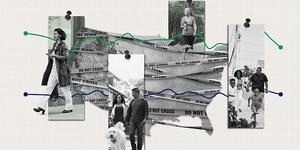With Saddam Hussein's dictatorship gone, the residents of Iraq are living in something of a political limbo. But if all goes according to plan, the Coalition Provisional Authority currently administering Iraq will eventually yield to self-government under a new constitution, followed by free elections. The form of government that ultimately results will be determined by that constitution, the drafting of which will be done under the auspices of the 25-member Iraqi Governing Council.
Gallup's new scientific survey in the capital city of Baghdad asked Baghdadis what form of government they would prefer if they were drafting the new constitution, and what form of government they think the country will have five years from now.
Among the nearly 150 question items Gallup asked in its scientific poll of Baghdadis, several focused on the type of government the people of Baghdad would like to see established in Iraq.
Respondents were most supportive of those systems that would seemingly provide the most public participation: either a multiparty parliamentary democracy, or a system based on the Islamic concept of shura (whereby leaders work through a process of consultation and public consensus). This latter option was added to the list based on pretests of the Gallup questionnaire, in which many respondents -- particularly those with less education -- volunteered it as an option that appealed to them. Other forms of rule that do not provide for public input are much less attractive to the people of Baghdad.
Baghdadis' governmental preferences are more likely to differ by educational background than by any other demographic variable tested -- including gender, age, and income differences. The higher a respondent's level of formal education, the less likely he or she is to favor an Islamic-based system of government and the more likely to favor either a parliamentary democracy or a constitutional monarchy.
Acceptability of Various Forms of Government
Gallup data on public acceptance of various forms of government reveal broad approval of two possible options: a multiparty parliamentary democracy, or a system based on shura. Fifty-three percent of residents say that a multiparty parliamentary democracy similar to that used in Europe and some Asian countries would be an acceptable form of government for Iraq. The same percentage say that a system based on shura would be acceptable.
At most, only a quarter of Baghdad residents are amenable to each of several other alternatives -- such as those modeled on a conservative Islamic kingdom as in Saudi Arabia, an Islamic theocracy in which religious leaders have strong influence (as in Iran), a conservative Islamic theocracy such as under the Taliban in Afghanistan, or an Islamic democracy, such as in Pakistan.
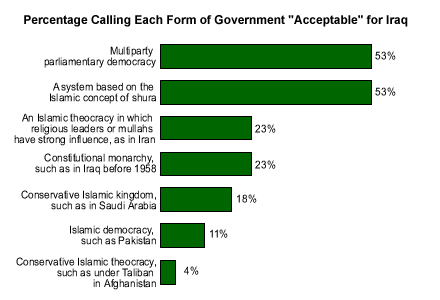
Preferred Form of Government
A follow-up question asked respondents to identify the one form of government they would most like to see established in Iraq. There is no clear leader, but the largest segment, 39%, prefers multiparty parliamentary democracy. A system based on the Islamic concept of shura comes in second, with 29% in favor. Eight percent would revert to the type of constitutional monarchy that ruled Iraq before 1958. A total of 17% chooses one of several conservative brands of Islamic-based rule:
- Of these more conservative systems, the one generating the most support is an Islamic theocracy, in which religious leaders or mullahs have strong influence. Ten percent of Baghdad residents prefer this system.
- Somewhat less popular, chosen by 5% of Baghdadis, is a conservative Islamic kingdom such as that in Saudi Arabia.
- Also attracting little interest is an Islamic democracy along the lines of that operating in Pakistan. Just 2% of respondents prefer this type of government.
- Even less attractive is the type of conservative Islamic theocracy that existed under the former Taliban regime in Afghanistan. Less than one half of 1% of Baghdadis (0.3%) chose this option.
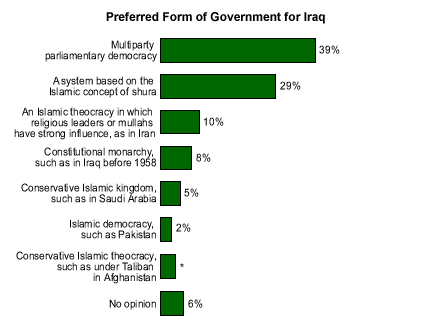
Notably, in the mainly Shiite ghetto of Sadr City, a theocracy in which religious leaders and mullahs have strong influence (as in Iran) is preferred by 20%. Among Sadr City residents, this option trails both a system based on shura (37%) and a multiparty parliamentary democracy (23%).
Expected Form of Government
Asked what form of government they think Iraq is most likely to have in five years, Baghdadis are most confident about the chances that a multiparty parliamentary democracy will take hold. Roughly 4 in 10 (42%) foresee this. About one in six (17%) think Iraq will be governed by a system based on the Islamic concept of shura, and 12% think it will take a more conservative Islamic form. Only 7% believe a constitutional monarchy will emerge. The remaining 22% could offer no prediction.
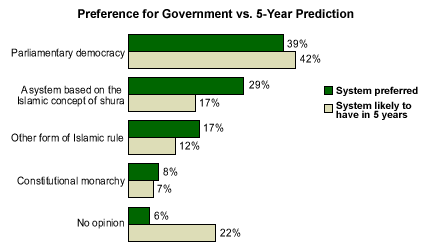
Preference for Democracy Increases With Formal Education
Baghdadi adults with more than an elementary education are much more likely than those of lesser education to favor a parliamentary democracy for Iraq. The percentage preferring this system rises from 26% among those with only an elementary education (up to fifth-grade), to 40% among those attaining an intermediate education (up to ninth-grade), to 45% among those with the U.S. equivalent of a high school education ("secondary" and "college" level education in Iraq) and to 53% among those who have attended a university.
Higher educational attainment is also associated with higher support for a return to constitutional monarchy in Iraq. Preference for Islamic-based rule -- whether relying on shura or not -- is fairly even among all education groups through high school, then drops sharply among those with a university-level education.
Conversely, in Rasafa and Al Karkh -- two of the most upscale districts in Baghdad -- the residents are the most favorably disposed to having a parliamentary democracy.
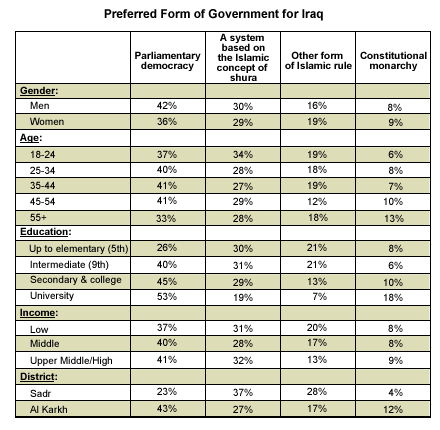
Only 35% of Baghdadis agree that the United States will allow Iraqis to fashion their own political future without direct U.S. influence. Half (51%) disagree with this and another 14% are unsure.
